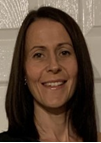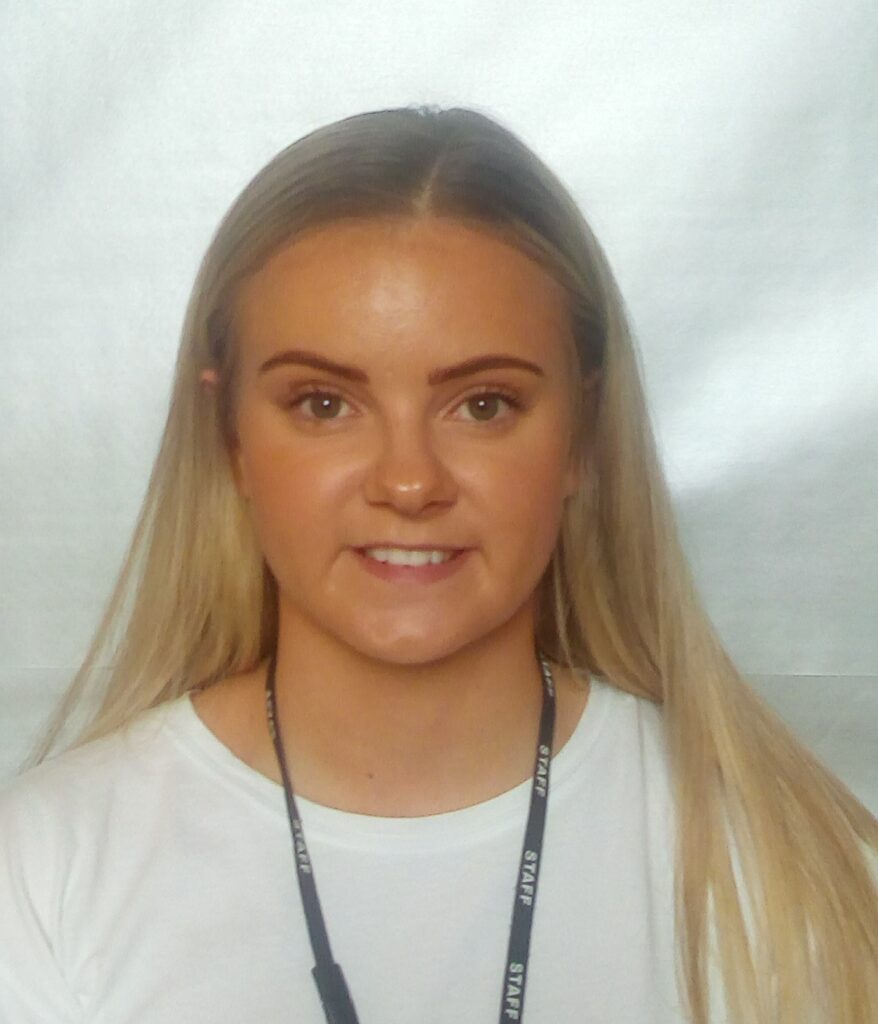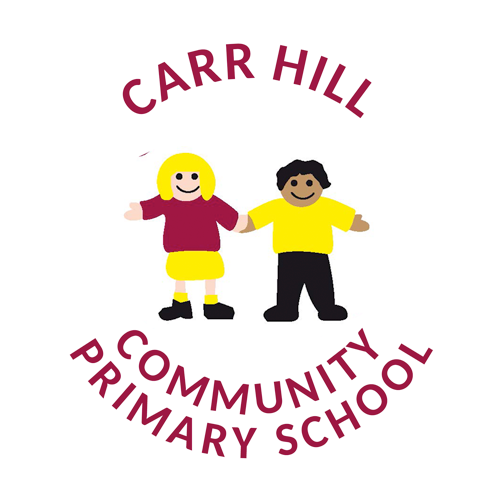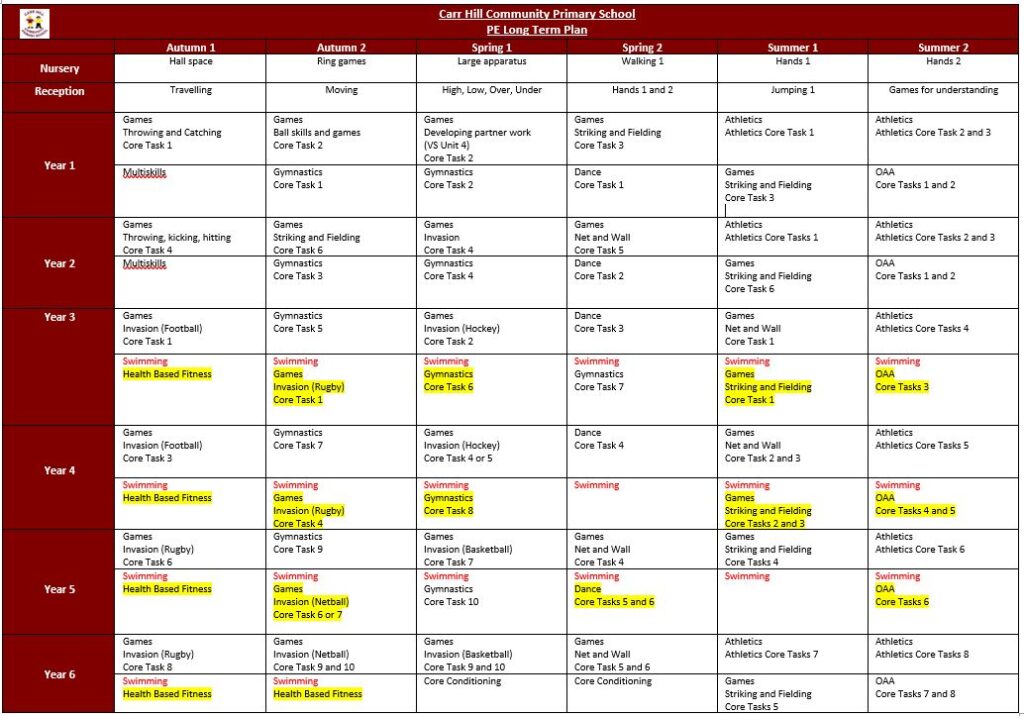

Mrs Thompson and Mrs Welsh lead the teaching of Physical Education in School.
Our Intent for Physical Education
At Carr Hill, Physical Education and School Sport is an integral and fun part of our curriculum. It is our intention to build a curriculum that enables children to develop knowledge, skills and vocabulary in a broad range of sporting activities, as well as developing values and transferrable life skills such as fairness and respect. Our PE curriculum is based on the National Curriculum. The subject leader has created progression documents from reception to year 6. These progression documents have been planned in order to build on the skills needed to meet the end of KS objectives in the National Curriculum. Our long-term plan is broad and balanced, allowing children to access to a wide variety of high-quality PE and sports provision. The long-term plan begins by focusing on the fundamental movement skills (ABC), and then moving onto skills and activities that can lead to different sports. Further up school, we start making the links between these skills and activities and sports. In years 5 and 6, it becomes more sport specific as we get them ready for secondary school. Children are given plenty of opportunities to build upon prior knowledge, allowing children to know more, and remember more. Children are given plenty of opportunities to take part in competitive sports throughout the year. There is a big emphasis on the development of teacher’s individual skills and knowledge through regular CPD. We work closely with the Gateshead School Sports Partnership to develop this.
Our Implementation for Physical Education
- The PE curriculum is planned using our Assessment for Learning Core Tasks as a baseline, which are in line with the National Curriculum. There are a wide variety of resources available to support the planning of individual lessons based on the needs of individuals, as well as groups and classes of pupils. Teachers are able to adjust and change lessons to suit the needs of their classes, but the Assessment for Learning Core Task criteria and progression steps provide a strong basis of what is expected in each year group. Each class has access to 2 hours of high-quality PE lessons every week. These are either taught by the class teacher, our Extended School Sports Coordinator, or a School Sport Coach, who has received the relevant training and support to deliver specific sports. Children are given the opportunity to practise skills in a variety of ways and each lesson builds upon the previous skills, allowing them time to embed them. These specific skills are also built upon year on year. Different skills are recapped throughout and across the years, each time they are being built upon; allowing children to know more and remember more.
- Years 3, 4 and 5 receive weekly swimming lessons, and follow the Swim England School Swimming Charter. These lessons run throughout the whole year. This means that children have the best opportunity to meet the swimming requirements as they have the whole year to learn, practise and apply the skills needed. This also means that by the time our pupils reach year 6, they are able to carry out the three key outcomes as outlined in the National Curriculum. Our annual figures from our year 6 assessments show that the number of pupils who can reach these National Curriculum requirements is increasing.
- We offer a wide range of sporting school clubs both before and after school. These are run by a number of agencies, including Juno sports, Little Kickers/Rugby and Triple A, as well as our own Extended School Sports Coordinator. These clubs are predominantly organised through the work we do with the Gateshead School Sports Partnership. These clubs are paid for by school but are subsidised by a half termly charge of £10 per pupil who participates. These clubs provide children with access to a wide range of sporting activities, including football, gymnastics, trampolining, cheerleading, multisport and Little Kickers. The clubs cater to a range of abilities. Clubs run Mondays to Thursdays. A range of inter and intra events run throughout the school year, giving children opportunities to take part in both competitive sports and sportsability events.
- Assessments are based on half termly teacher assessments and are recorded on our Assessment for Learning Core Task sheets which are kept in year group files. Pupils are also given time to reflect on their learning, and take part in self, peer and group feedback within lessons and following lessons.
The Impact of Physical Education
Our children have a secure understanding of the benefits of leading healthy lifestyles (pupil voice). Children are able to know more and remember more about the importance of healthy lifestyles. They progress well throughout each year group and most meet the NC objectives. Our Assessment for Learning Core Tasks allow teachers to assess pupils at the beginning and end of every unit of work, and to tailor the learning to suit the needs of pupils within their classes. Every child is given the opportunity to participate competitively, within lessons, but also through the varied timetable of sporting events offered to us through our affiliation into the Gateshead School Sports Partnership. Children are eager to attend after school clubs and competitive sports events, and even the least confident children are keen to attend. There is a timetable of sportsability events throughout the school year, which also allows our SEN children to access a variety of alternative sports, such as Boccia, in a competitive setting.
School Sports Premium Funding
The Government is providing each primary school throughout England with additional funding which is to be spent on improving the sports provision within schools. At Carr Hill Community Primary School, provision is enhanced through the use of the Sports Premium Funding and is covered by the 5 key performance indicators. We believe a high-quality PE curriculum should be an integral part of the whole school curriculum and one that staff, pupils and parents understand and can contribute to. Our school recognises the values that a high-quality PE and school sport curriculum gives pupils. Please visit the School Sports Premium Funding information page to find out more about what we have been doing with the Sports Premium Funding.
Purpose of study
A high-quality physical education curriculum inspires all pupils to succeed and excel in competitive sport and other physically demanding activities. It should provide opportunities for pupils to become physically confident in a way which supports their health and fitness. Opportunities to compete in sport and other activities build character and help to embed values such as fairness and respect.
Aims
The national curriculum for physical education aims to ensure that all pupils:
develop competence to excel in a broad range of physical activities
are physically active for sustained periods of time
engage in competitive sports and activities
lead healthy, active lives
Subject content
Key stage 1
Pupils should develop fundamental movement skills, become increasingly competent and confident and access a broad range of opportunities to extend their agility, balance and coordination, individually and with others. They should be able to engage in competitive (both against self and against others) and co-operative physical activities, in a range of increasingly challenging situations.
Pupils should be taught to:
master basic movements including running, jumping, throwing and catching, as well as developing balance, agility and co-ordination, and begin to apply these in a range of activities
participate in team games, developing simple tactics for attacking and defending
perform dances using simple movement patterns
Key stage 2
Pupils should continue to apply and develop a broader range of skills, learning how to use them in different ways and to link them to make actions and sequences of movement. They should enjoy communicating, collaborating and competing with each other. They should develop an understanding of how to improve in different physical activities and sports and learn how to evaluate and recognise their own success.
Pupils should be taught to:
use running, jumping, throwing and catching in isolation and in combination
play competitive games, modified where appropriate [for example, badminton, basketball, cricket, football, hockey, netball, rounders and tennis], and apply basic principles suitable for attacking and defending
develop flexibility, strength, technique, control and balance [for example, through athletics and gymnastics]
perform dances using a range of movement patterns
take part in outdoor and adventurous activity challenges both individually and within a team
compare their performances with previous ones and demonstrate improvement to achieve their personal best
Swimming and water safety
All schools must provide swimming instruction either in key stage 1 or key stage 2.
In particular, pupils should be taught to:
swim competently, confidently and proficiently over a distance of at least 25 metres
use a range of strokes effectively [for example, front crawl, backstroke and breaststroke]
perform safe self-rescue in different water-based situations
Progression Steps
Below are links to Carr Hill’s knowledge progression steps for each year group:
Planning

